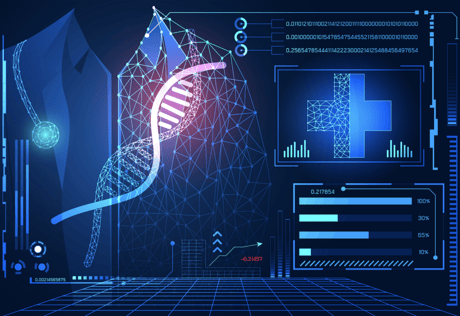Have a Question?
Get in Touch
Owing to its contribution in building a thriving and productive community, healthcare is considered one of the most critical sectors in the broader landscape of big data. With a wide range of applications, AI can assist everyone in the healthcare industry, from doctors, nurses, and patients to other healthcare workers in their day-to-day work.
In this blog, we’ll explore the role of AI in healthcare, along with some of the most important applications of AI in this sector.
What is AI in Healthcare?
AI in healthcare is a discipline navigating various applications of artificial intelligence, ML, and similar coming-of-age technologies, specifically in medical settings.
In the simplest sense, it’s the intelligent use of machines to analyze and act on medical data, typically to predict a particular outcome.
Here are some of the significant ways AI is changing healthcare now and will continue to do so in the future:
AI in ElderCare
Our most at-risk seniors always have a fear of falling and having no one around to immediately help them. Fortunately, with Kami Vision’s AI-based fall alert system, Kami Care Fall Management Solution, seniors can live worry-free as the system is 99% accurate. Once a fall is detected, the Kami Vision AI sensor captures the fall and alerts the designated caregivers, which can be family or staff at an assisted living facility, allowing them to take the appropriate course of action.
The Kami Care Fall Management and other different systems for different challenges will transform how the elderly age in place.
AI in Clinical Data
AI has a large range of potential applications in both long and short-term clinical trials. AI offers the promise of addressing several of the most challenging aspects of drug development in healthcare, along with potential benefits for pharmaceutical companies, patients, investigators, and regulators.
AI can be applied in multiple other stages of clinical trials ranging from identification of drug tests to repurposing of old drugs. In addition to this, AI is being of great help in improving the overall usage of data to find suitable patients and keep track of the end-to-end journey of patients and drug successes throughout clinical trials.
Here are some of the other ways in which AI is being implemented in clinical trials:
-
Clinical trial design
-
Improved patient and site selection
-
Patient monitoring
-
Fostering more trials
AI for Personalized Medications and in Care to Address Different Diseases
AI allows you to develop and find the best medications and treatment plans to treat different diseases as per the patient’s information, thus reducing costs and increasing the effectiveness of patient care. Some of the ways AI does this include:
AI and ML technology effortlessly match patients with the treatments that prove to be the most effective for them.AI enables structuring, analyzing, and learning from the data that health systems have to provide personalized treatment and care addressing different diseases.

Other Noteworthy AI Applications in Healthcare
AI in Cancer Research
Current applications of AI, machine learning, and deep learning in cancer research and clinical care are highly diverse, ranging from predicting oncoprotein folding/dynamics to aiding radiologists in reading detailed medical images.
Identifying Rare Genetic Diseases
In recent years, AI has emerged as a new and promising tool in the fight against identifying rare genetic diseases. There are several companies developing platforms that harness AI as an effective means to identify rare genetic variants at the roots of rare diseases, which would have been quite a laborious and time-consuming process in the past.
To Conclude
AI in healthcare plays an instrumental role as it could be used to make more accurate diagnoses, manage/ assign administrative resources, identify at-risk populations, and better understand how patients will respond to treatment protocols.
It is, however, important to keep in mind that AI is not here to replace healthcare professionals but rather to empower them by providing a more data-driven context, allowing them to make better and more informed decisions.

